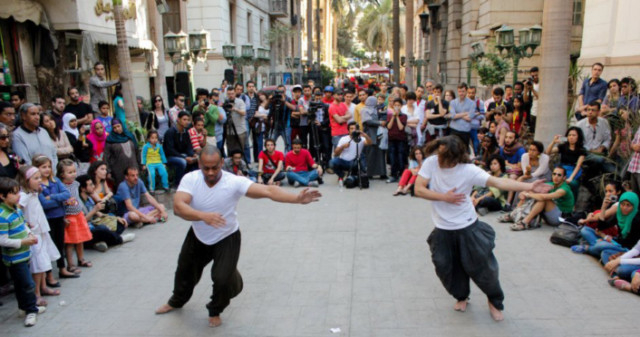
Cairo: The concrete barriers and occasional skirmishes over the past two years have turned downtown Cairo into a bleak place. Residents and passers-by find it hard to lead their normal lives. But this month a new generation of artists has been finding creative ways to overcome these challenges.
Three multidisciplinary arts festivals, the Second Downtown Contemporary Arts Festival (D-CAF), Hal Badeel (Alternative Solution) and Al Fan Midan (Art is a Square) will raise the curtain on their exciting programmes, which cater to both the local community and hopefully those who have been avoiding the neighbourhood altogether.
For four weeks, a selection of plays, stand-up comedy shows, dance performances and experimental films by upcoming filmmakers will play. Everyone involved, from the organisers and artists to the technicians and carpenters, are volunteering, bringing in their own materials and devoting their time.
Events take place in theatres and other historic buildings built between 1879 and the early 1950s, an era when Cairo’s downtown — stretching east from Tahrir Square towards Abdin Palace — was considered a cultural melting pot and the architectural Paris of the Middle East.
In addition to bringing influential foreign artists to Egypt, D-CAF artistic director Ahmad Al Attar says, “We want to reconnect Cairenes with their urban landscape.” He also hopes that citizens and visitors who now identify downtown with Tahrir Square and political protest will “rediscover the cultural spaces that have long been part of who we are as Egyptians.”
Performance spaces include 19th-century cafés, a 50-year old belly-dancing club, a neg-lected early-20th-century hotel, a restored Art Deco theatre, and the Boursa pedestrian area in front of the stock exchange.
Partly sponsored by a real estate consortium, which has purchased several buildings in downtown Cairo over the past few years as part of its urban regeneration project, one of D-CAF’s main goals is to “revive the neighbourhood, and make it once again a place where people from all roads of life meet,” explains Kareem Al Shafei, chief executive officer of the consortium.
The D-CAF kicked off its zero edition last April with two weeks of cutting-edge plays, dance performances, concerts, an exhibition on censorship of artworks and a film programme.
Expansion
This month, the D-CAF has expanded the programne over an entire month, with more interactive acts — from a feature where passers-by can write anything they want on a gadget and have it projected live onto a shop front on Adly Street, to a live performance in a shop window overlooking Mahmoud Basiony Street with which pedestrians become involuntarily entangled.
For Al Attar, another key function of D-CAF is to highlight some of the most experimental performances from Egypt and abroad, while also linking performance artists across the continents.
“Festivals are different from showcases,” he says. They need to present “a multitude of offers within a given time.” The problem with many of the state’s existing festivals, he explains, is that they lack a clear artistic vision and are often used as propaganda for a particular regime.
The Hal Badeel (Alternative Solution) hopes also to address these problems. It will kick off this week only a few blocks away from some of D-CAF’s numerous venues.
But it also proposes a crowd-funding model of sorts. Hal Badeel is exhibition manager Mido Sadek and theatre practitioner Saber Al Sayed’s response to the closing of downtown’s Rawabet Theatre, a major hub for alternative performing artists, earlier this year due to funding challenges.
“We did not want the performing arts scene to be at the mercy of funding organisations,” explains Sadek. “Whenever their priorities change, so does the artists’ ability to show their work and people’s access to them.”
The idea is to take up spaces rarely used for performing arts and turn them into well-functioning pseudo theatres that engage local communities, explains Sadek. For their first edition, they have managed to take up the Townhouse Gallery’s Factory Space, which has a regular visual arts exhibition programme, and convert it into a full-fledged theatre.
For their next issue, they want to repeat the experiment in a different location, possibly a dilapidated building or an empty piece of land being used as a garbage collection point. They would take it, clean it and once again turn it into a space to host the itinerant festival.
But finding sustainable funding might be a challenge. Attar admits that the zero edition of D-CAF incurred losses despite having revenue from tickets and some corporate sponsorship. Since April 2011, cultural organisations have come together to host performances, first in downtown’s Abdeen Square on the first Saturday of the month, and over time, to the different governorates of Egypt.
Ayman Sharaf is an Egyptian Journalist based in Cairo.












